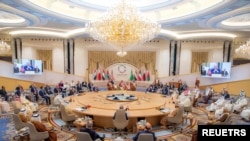U.S. President Joe Biden and Middle East leaders have reaffirmed security cooperation in the face of threats, including Iranian military and nuclear activities. Saudi Arabia and other regional players also offered to increase oil production to stabilize energy markets rattled by the Ukraine conflict.
Saudi Crown Prince Mohammed Bin Salman presided over the Jeddah summit Saturday, as leaders listened to U.S. President Joe Biden present his vision of his country's role in the Mideast in the face of Iranian military aggression and the expansion of Russia and China.
Biden insisted that Washington, under his watch, would not take a back seat to a growing role by Russia or China in the region.
"The United States is going to remain an active and engaged partner in the Middle East,' biden said. "As the world becomes more competitive and the challenges we face more complex, it's only becoming clearer to me how closely interwoven America's interests are with the successes of the Middle East."
Saudi Crown Prince Mohammed Bin Salman also addressed Iran's threat to the region during his remarks to the summit.
He says that the summit comes at a time of major threats to the countries in the region and that Iran should not be allowed to interfere in (the Yemen conflict) and that Iran’s nuclear program should abide by the rules of the International Atomic Energy Agency.
Egyptian President Abdel Fattah el-Sisi called for "mutual efforts to end conflicts in the region and stop outside intervention in those conflicts." He also blasted countries that "move mercenaries from one country to another and create militias to destabilize countries." He also decried the spread of nuclear weapons in the region, without specifically referring to Iran.
Iraqi Prime Minister Mustafa Khadhimi, whose country and government are under pressure from neighboring Iran, thanked neighbors Saudi Arabia, Jordan and Egypt for agreeing to connect their electricity grids with Iraq's and help alleviate growing energy shortages. He also urged further cooperation to address food and energy security that are threatening his country and others in the wake of the Ukraine conflict.
Egyptian political sociologist Said Sadek tells VOA that Saudi Arabia, while not giving President Biden the warm welcome given to other regional leaders, made a gesture to the U.S. president to increase its oil production and address U.S. domestic energy concerns.
"The Saudis had to come up with some rewards (for the U.S.). Now we see that (they) are going to raise their domestic oil production from 10 million barrels (per day) to 13 million barrels in (the coming) months...," said Sadek.
Sadek went on to say that despite Biden's tough talk against Saudi Crown Prince Mohammed Bin Salman during the election campaign, he appears to have softened his position toward him and that the U.S. "really has no other alternative to MBS," who is likely to succeed King Salman, when he dies.

